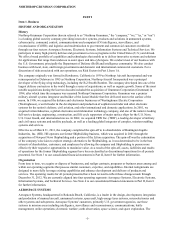Northrop Grumman 2012 Annual Report Download - page 18
Download and view the complete annual report
Please find page 18 of the 2012 Northrop Grumman annual report below. You can navigate through the pages in the report by either clicking on the pages listed below, or by using the keyword search tool below to find specific information within the annual report.
NORTHROP GRUMMAN CORPORATION
-8-
challenging environment, our industry could face a significant number of terminations, change orders and stop work
orders, which by their volume could further delay and jeopardize our industry's ability to recover costs.
Significant delays or reductions in appropriations for our programs and U.S. Government funding more broadly
may negatively impact our business and programs and could have a material adverse effect on our financial
position, results of operations or cash flows.
U.S. Government programs are subject to annual congressional budget authorization and appropriation processes.
For many programs, Congress appropriates funds on a fiscal year basis even though the program performance period
may extend over several years. Consequently, programs are often partially funded initially and additional funds are
committed only as Congress makes further appropriations. If we incur costs in excess of funds obligated on a
contract, we may be at risk for reimbursement of those costs unless and until additional funds are obligated to the
contract. We cannot predict the extent to which total funding and/or funding for individual programs will be
included, increased or reduced as part of the annual budget process ultimately approved by Congress or in separate
supplemental appropriations or continuing resolutions, as applicable. The impact, severity and duration of the
current U.S. economic situation and plans adopted by the U.S. Government, along with pressures on, and
uncertainty surrounding, the federal budget and the permissible federal debt limit, could adversely affect the funding
for individual programs and delay purchasing or payment decisions by our customers. In the event that government
funding for any of our programs becomes unavailable, or is reduced or delayed, our contract or subcontract under
such program may be terminated or adjusted by the U.S. Government or the prime contractor, which could have a
material adverse effect on our financial position, results of operations and/or cash flows.
In addition, if the existing statutory limit on the amount of permissible federal debt is not raised, we may be required
to continue to perform for some period of time on certain of our U.S. Government contracts even if the U.S.
Government is unable to make timely payments. An extended delay in the timely payment of billings by the U.S.
Government would likely result in a material adverse effect on our financial position, results of operations and cash
flows.
In August 2011, Congress enacted the Budget Control Act which, while raising the existing statutory limit on the
amount of permissible federal debt, also committed the U.S. Government to significantly reducing the federal deficit
over ten years. The Budget Control Act established caps on discretionary spending through 2021, reducing federal
spending by approximately $1 trillion over that period relative to the fiscal year (FY) 2012 Presidential budget
submission, and called for very substantial automatic spending cuts, known as "sequestration," split between defense
and non-defense programs.
In January 2013, Congress enacted the American Taxpayer Relief Act of 2012. It addressed a number of tax code
provisions and certain spending issues, but left in place the sequester (although delaying its implementation to
March 1, 2013) and did not address other fiscal matters such as the debt ceiling. The delay in the sequester leaves
the DoD less time to enact 2013 automatic spending cuts and adds to the uncertainty from such cuts. The nation's
debt ceiling is currently expected to be reached during the first half of 2013. Congress and the Administration
continue to debate these issues and the terms of a possible national fiscal approach. The outcome of that debate
could have a significant impact on future defense spending plans. While the President's proposed FY 2014 Budget is
scheduled for release in February 2013, its delivery may be delayed given these unresolved fiscal matters.
We are unable to predict the impact that the delayed automatic cuts or other defense spending cuts would have on
funding for our individual programs. Long-term funding for certain programs in which we participate may be
reduced, delayed or cancelled. In addition, these cuts could adversely affect the viability of our suppliers and
subcontractors. While we believe that our business is well-positioned in areas that the DoD has indicated are areas of
focus for future defense spending, the impact of the Budget Control Act and the ongoing fiscal debates remain
uncertain and our business and industry could be materially adversely affected.
The President's proposed budget for FY 2013 represented a slight decline from FY 2012 levels. Although Congress
passed a continuing resolution to fund U.S. Government operations through March 27, 2013, it is unclear whether
annual appropriations bills will be passed during FY 2013. The U.S. Government may operate under a continuing
resolution for all of FY 2013, potentially resulting in no new contract or program starts for that year.
The Congressional budget process has been marked by significant debate within the government regarding FY 2013
defense spending. Budget decisions made in this environment will likely have long-term consequences for our
company and the entire defense industry. Should sequestration as currently mandated be implemented in March
2013, absent any other changes, we believe it would have serious negative consequences for the security of our
country, the defense industrial base, including Northrop Grumman, and the customers, employees, suppliers,
























